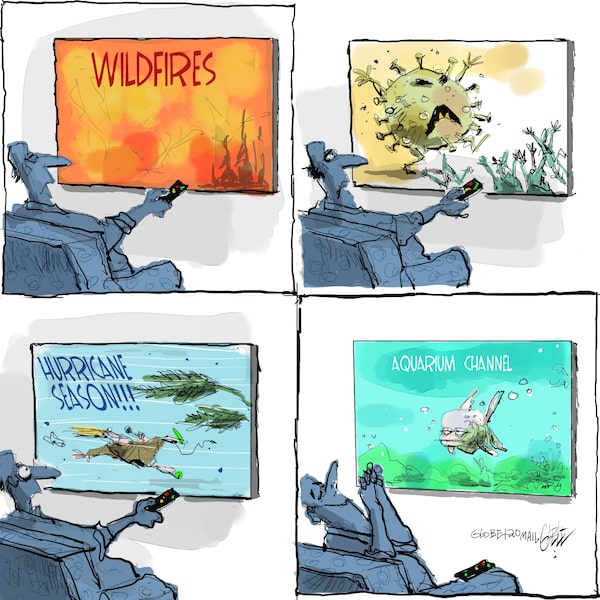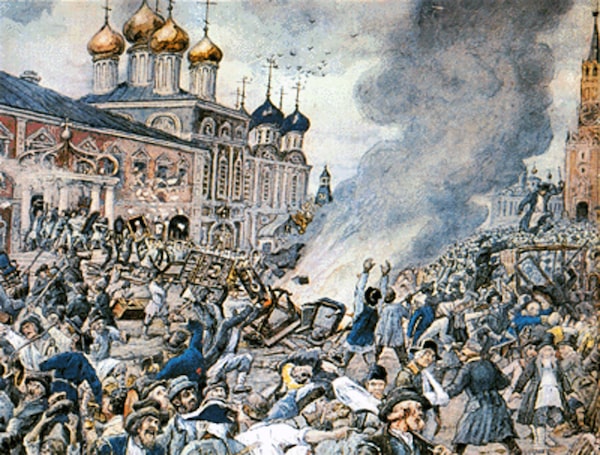Good morning,
Energy giant BP says the world has likely passed peak oil demand as it predicts fossil fuel consumption will fall for the first time in modern history.
The company forecasts in its 2020 Energy Outlook that economic activity around the world will partly recover from the COVID-19 pandemic, but there will be a slowdown in energy consumption as employees continue to work from home.
However, the overall demand for energy will continue to grow, BP says, as renewable sources eclipse fossil fuels. For example, the global demand for oil will shrink over the next 30 years as people move more and more toward buying electric vehicles, the report says.

Pumpjacks draw oil out of the ground near Olds, Alta., Thursday, July 16, 2020. THE CANADIAN PRESS/Jeff McIntoshJeff McIntosh/The Canadian Press
This is the daily Morning Update newsletter. If you’re reading this on the web, or it was forwarded to you from someone else, you can sign up for Morning Update and more than 20 more Globe newsletters on our newsletter signup page.
Ottawa appoints new management for pandemic warning unit
The Public Health Agency of Canada has installed new management to supervise and “strengthen” the country’s pandemic surveillance system.
Brigitte Diogo has taken over as the vice-president of the Health Security Infrastructure Branch, which oversees the government’s pandemic early warning and surveillance unit, known as the Global Public Health Intelligence Network, or GPHIN. Sally Thornton, who previously served in that role, left the government last week, the department said.
GPHIN has been embroiled in controversy after a Globe and Mail investigation in late July detailed how the network’s intelligence-gathering capabilities were reduced significantly in late 2018 and early 2019. The move effectively shut down much of its surveillance work on international health threats less than eight months before the COVID-19 outbreak in China began to spread, and appears to have affected Canada’s ability to gauge the risk of the virus.
Trudeau shifts focus to COVID-19 resurgence
As the country battles rising numbers of COVID-19 cases, the federal government is shifting its priorities from rebuilding the economy to dealing with the immediate health and economic challenges of the resurgence.
The Prime Minister is meeting with his cabinet for a two-day planning session on how to deal with this crisis. “Our focus right now is on the COVID crisis. We need to get through this in order to be able to talk about next steps. We are not out of the woods. We need to continue to remain vigilant. … The last thing anyone wants is to go into this fall in lockdown similar to this spring,” Justin Trudeau said.
A government source said the cabinet meeting will also focus on the inequalities exposed by the pandemic, such as the disproportionate effect on women in the work force, systemic racism and poverty.
Got a news tip that you’d like us to look into? E-mail us at tips@globeandmail.com Need to share documents securely? Reach out via SecureDrop
ALSO ON OUR RADAR
Boris Johnson sparks backlash with new bill that would undermine U.K. withdrawal from EU: British Prime Minister Boris Johnson has sparked a new Brexit crisis by introducing legislation that would undermine key parts of the withdrawal treaty he signed with the European Union last year. The Prime Minister’s move has been criticized by EU leaders and former British prime ministers who say the proposed bill goes against international law and would hurt chances of a trade deal between Britain and the EU. Late Monday, the bill passed an initial hurdle in the House of Commons by a vote of 340 to 263. But more votes are coming this week and several MPs have proposed changes to the bill that could win support.
Progressive Conservatives win majority in New Brunswick: The Progressive Conservatives will form the next government in New Brunswick after winning the provincial election. It is the first time since 2003 that New Brunswickers have returned the incumbent party to power. The election was the first in Canada since the emergence of the COVID-19 pandemic.
GardaWorld makes $5-billion play for British security firm: Montreal-based security company GardaWorld is mounting a $5-billion hostile takeover of its British rival G4S. GardaWorld is appealing directly to G4S shareholders after three earlier attempts to engage the company’s board of directors were rebuffed. Winning G4S is a key piece in GardaWorld’s strategy to build the world’s “leading security services business,” chief executive officer Stéphan Crétier said.
MEC sold to U.S. private investment firm: Sports and outdoor recreation retailer MEC has obtained creditor protection and agreed to be sold to a U.S. private investment firm. The sale ends the company’s 49 years as a co-operative. The COVID-19 pandemic took a toll on the retailer as sales were slow and it was forced to close stores across the country.
Astronomers may have found a potential sign of life in Venus’s clouds: Astronomers may have found life in the clouds around Venus. Two telescopes in Hawaii and Chile spotted the chemical signature of phosphine in the sulphuric acid-laden clouds around the planet. Phosphine is a gas that on Earth is only associated with life.
MORNING MARKETS
Yuan at 16-month high: World stocks rose this morning on the back of upbeat Chinese data and optimism about novel coronavirus vaccines, as a struggling U.S. dollar kept the hot streaks for the euro and some of the biggest emerging market currencies sizzling.
The euro’s fifth day of gains made for a slow start in continental Europe but a solid 0.8% rise on London’s international and commodity-heavy FTSE maintained the overnight momentum from Asia and Wall Street.
Just before 6 a.m. ET, Britain’s FTSE 100 was up 0.89 per cent. Germany’s DAX and France’s CAC 40 rose 0.32 per cent and 0.54 per cent, respectively. In Asia, Japan’s Nikkei ended the day down 0.44 per cent. Hong Kong’s Hang Seng gained 0.38 per cent. U.S. futures were higher. The Canadian dollar was trading at 75.99 US cents.
WHAT EVERYONE’S TALKING ABOUT
André Picard: “Politicians and public-health officials may not know precisely what will happen next, but they do have six months of knowledge to incite them to not repeat the same mistakes. The last thing we need is, come Groundhog Day 2021, to be reading the same old mind-numbing headlines such as: ‘Coronavirus Cases Continue to Climb in Canada.’ ”
Laura Hillyer: “The Ontario government should take steps to effect much-needed changes to the civil jury system. It is possible to provide injury victims with timely and fair access to the civil courts, while decreasing the civil case backlog. The right to a civil jury should be reserved for a small subset of cases, such as those that trigger the public interest or where community values are at stake. Then, when friends and family receive jury notices, I will have no reservations about encouraging them to seize the opportunity to serve as a juror.”
Daoud Kuttab: “For their part, Arabs and Palestinians long for normal relations with Israel, but only after the occupation has ended. When one party is a military power with even more powerful friends, peace must be reached through a just settlement, not unilateral action. A country that serially violates human rights and international treaties should not be rewarded with normal relations, even from tiny Arab gulf countries.”
TODAY’S EDITORIAL CARTOON

By Brian GableBrian Gable/The Globe and Mail
LIVING BETTER
Donner Prize finalists: What keeps them up at night?
The fate of the world caused by falling populations, Canada’s relationship with a belligerent China, the future of Canada’s resource economy, the threats posed to Canada’s culture in the digital age – these are some of the daunting topics of some of the books shortlisted for the $50,000 Donner Prize. Brad Wheeler asked each of the nominated authors one question: In these unsteady and unsafe times, what keeps them up at night? Their answers might rattle even Stephen King.
MOMENT IN TIME: SEPTEMBER 15, 1771

Plague Riot in Moscow in 1771: During the course of the city's plague, between 50,000 and 100,000 people died, 1/6 to 1/3 of its population. A 1930s watercolor illustration by E. Lissner.FLHC 2 / Alamy Stock Photo
Plague riots erupt in Moscow
At the peak of the outbreak in Moscow, the bubonic plague was killing hundreds of people each day, with a death toll of 21,000 in September of 1771 alone. Corpses littered the streets, and citizens were starving because workplaces were shuttered and supplies weren’t delivered. The chief public-health doctor died, the governor deserted and nobles fled to the country.
Compounding the fear and misery were poorly understood emergency measures that forbade large gatherings, restricted movement and destroyed contaminated property without compensation. The atmosphere was ripe for a riot.
The trigger was Archbishop Ambrosius’s decision to remove an icon of the Virgin Mary from Varvarsky Gate to prevent further infections among the crowds at her feet. Muscovites didn’t take well to losing a source of comfort in hard times. On Sept. 15, a mob stormed the Kremlin and destroyed the archbishop’s residence. The military suppressed the uprising within three days, but 100 people died, 300 were arrested and Ambrosius was violently slaughtered.
New leadership arrived in the city on Sept. 26 and established strict quarantine measures, along with better communication about their importance, and financial relief for survivors. Cases started to drop, and by mid-November the epidemic was declared over. Joy Yokoyama
If you’d like to receive this newsletter by e-mail every weekday morning, go here to sign up. If you have any feedback, send us a note.